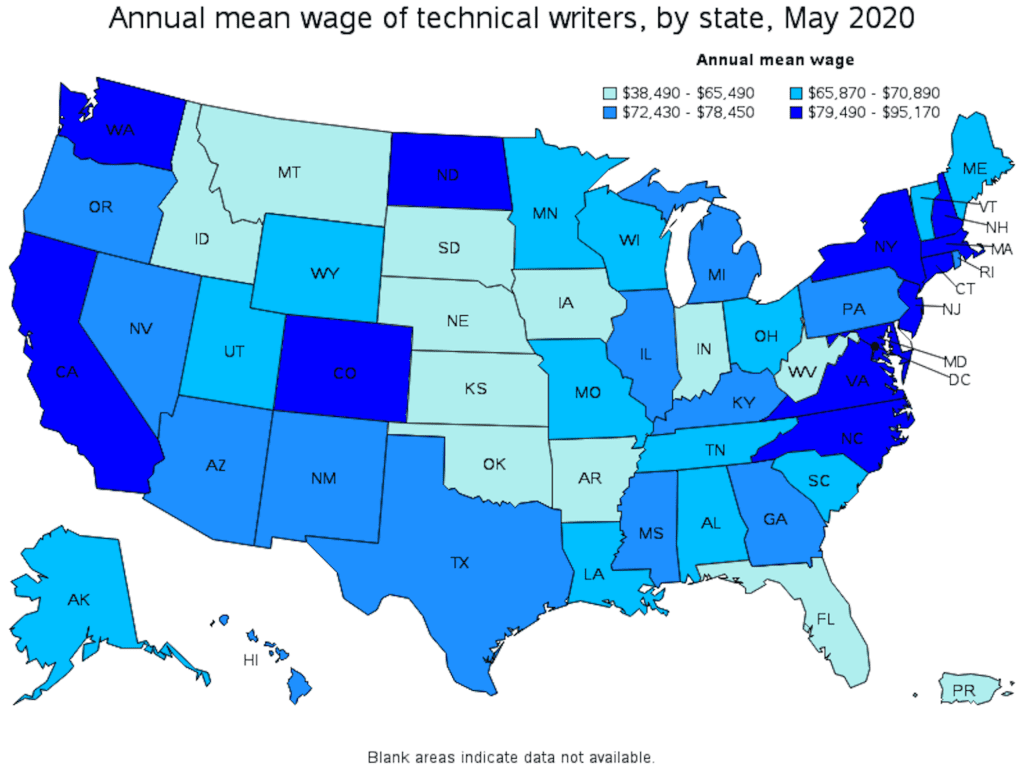Are you passionate about technology and writing? If “yes”, then technical writing may be a great career option for you.
In this post, we’ll cover what a technical writer is, types of technical writing, skills you’ll need, technical writing jobs, and what tech writing salaries look like. Then we’ll dive into how you can get into technical writing, plus resources like courses and certificates to kickstart your career in the field.
Are you looking to learn about tech writing in 2021? If so, continue reading!
Disclosure: I’m a proud affiliate for some of the resources mentioned in this article. If you buy a product through my links on this page, I may get a small commission for referring you. Thanks!
What Is a Technical Writer?
What is technical writing? In short, the job of a technical writer involves taking complex, often hard-to-understand information and breaking it down into simple, friendly, easy-to-understand concepts and guides. Technical writing examples could be anything from how to install a certain type of software to how cryptocurrency works to how to assemble a piece of furniture.
The focus is on clear and precise language. Technical writer jobs are great if you have some sort of technical background but love writing and breaking down information.

How is Technical Writing Different Than Business Writing?
Technical writing typically involves science, engineering, and technology topics, while business writing usually involves more creativity and focuses on less complex content.
Business writing typically includes copywriting, content writing, emails, memos, business letters, etc. Anything that isn’t, you guessed it, “technical.”
Types of Technical Writing
Technical writers typically fall into one of three buckets: technical marketing writing, end-user documentation, and research-based technical writing.
- 📚 Technical marketing writing: case studies, white papers, ebooks, press releases, blog articles on complex topics, etc.
- 📝 End-user documentation technical writing: user guides, assembly instructions, product manuals, etc.
- 🧪 Research-based technical writing: scientific/medical research papers, laboratory reports, journal articles, etc.
You don’t necessarily have to choose just one type of technical writing, but when you’re first looking for how to get into technical writing, it should help to target an industry you’re already familiar with.
What Does a Technical Writer Work On?
The specific details of technical writing jobs depend on the industry, company, and job, but real-world technical writing examples can include repair manuals, help center articles, consumer product manuals, press releases, software release notes, troubleshooting guides, medical studies, case studies, how-to guides, journal articles, software test plans, press releases, assembly instructions, product descriptions, user interface text, technical reports, educational inserts, and much more.
What they write may be published online or in print, depending on how technical writing content is used in the company and its intended goal.

Why Is Technical Writing Important?
Technical writing skills are extremely important for communicating technical concepts to non-experts.
A software engineer might not always be the best at explaining their software in “layman’s terms,” but the end user isn’t going to recognize technical jargon. Doctors know all the niche medical terminology, but it’s all Greek to someone who hasn’t been to medical school. Technical writers help to bridge those gaps.
☝️ Back to top
Technical Writer Jobs / Job Outlook
So, now that we’ve covered what technical writing is and how it’s used, let’s check out technical writing jobs.
Because there’s such a wide variety of technical writing applications, there’s a job market to match. You can find entry-level technical writing jobs, remote technical writing jobs, technical writing internships, etc.
✍️ Types of technical writing jobs
Technical writers can work in a wide variety of industries, but are most commonly found in tech- and science-based industries like software, biotech, manufacturing, aerospace, consumer electronics, architecture, medical, and defense.
According to the U.S. Bureau of Labor Statistics, industries with the highest levels of employment in technical writing jobs are:
- Computer Systems Design and Related Services
- Management, Scientific, and Technical Consulting Services
- Employment Services
- Architectural, Engineering, and Related Services
- Scientific Research and Development Services
UX writers, technical editors, medical technical writers, and technical marketing writers are all specialities that typically fall under the technical writing umbrella.

✏️ Technical writing skills
We’ll cover more about how to get into technical writing later, but obviously it starts with building up your technical writing skills.
Here are some of the most important technical writing skills:
- Strong writing skills; ability to write in plain, clear English. (Sidenote: Grammarly is a great tool to help build your skills with clear, succinct writing!)
- Ability to learn complex technologies/topics quickly
- Research skills (from interviews, online, books, databases, etc.)
- Strong attention to detail; as a technical writer you have to maintain consistency
- Interpersonal and collaboration skills; you’ll need to interact with engineers, product managers, designers, researchers, scientists, etc.
- Knowledge of editorial style guides: Depending on the role, you may need to know certain style guides. Common ones such as the Chicago Manual of Style or APA Style, but also technical writing specific ones, like the Microsoft Writing Style Guide or the Google developer documentation style guide
- Knowledge of Document Development Life Cycle (DDLC)
- Ability to understand code (for some jobs): Depending on the job, you may need to know certain technologies or programming languages, or at least have some familiarity with them in order to write about them accurately
- Problem-solving: Technical writing involves figuring out the best ways to communicate complex topics, which requires problem-solving skills
Chances are, you probably have a few transferable skills from past jobs. For example, if you’ve worked in customer service for a piece of software, you’re used to helping people troubleshoot their problems and breaking down how-to explanations into simple language.
💰 Salary info
The average salary for a technical writer is $33.75 per hour / $57,995 per year in the United States. As an entry-level technical writer, you could earn $48,526/year, while senior technical writers earn $67,330/year. Keep in mind, these are averages; some technical writers can even make close to six figures.
This can vary, of course, based on your location, the company, years of experience, etc.
For example, the average hourly wage for technical writers in California is $45.11, while the average hourly wage for technical writers in Florida is $30.03.

Top-paying U.S. states for technical writers are Washington, D.C., California, Massachusetts, Washington, and Virginia
📈 Job availability
According to the U.S. Bureau of Labor Statistics, employment of technical writers is projected to grow 7% from 2019 to 2029, faster than the average for all occupations.
U.S. states with the highest employment level of technical writers are: California, Texas, Florida, Virginia, and Maryland.
Technical writing is a field that’s growing and will always be in demand. If you’re passionate about writing, it’s a solid career that can pay the bills (and you can still write your novel on the side).
🖥️ Where to look for technical writing jobs
This depends on what type of technical writer jobs you’re looking for. Do you want to get into freelance technical writing or find remote technical writing jobs? Or would you rather have a traditional technical writing job with one company?
- For freelance technical writing gigs, check out freelance sites like Upwork, Flexjobs, and Fiverr
- For all types of technical writing jobs, check specific job boards like Write the Docs Job Board, JustTechJobs, and TheWriteJobs
- For more traditional company jobs, a good bet is online job sites like Indeed and LinkedIn
Like with any type of job hunting, it’s also smart to tap into your existing professional network. Ask around to see if a friend of a friend knows anyone hiring a technical writer, make a post on your LinkedIn, etc.

☝️ Back to top
How to Become a Technical Writer
If this all sounds good so far, let’s look at how to get into technical writing with three basic steps.
1. Hone your technical writing skills
Go back to that list of technical writing skills. Which ones do you already have and where is there room to improve?
- Take online technical writing courses like Tech Writers Master Class on Udemy (we’ll link to more technical writing courses later on).
- Read! Anything, but especially technical documentation. Reading is said to improve your writing skills. Even just reading novels or nonfiction as a hobby can help you develop stronger writing skills.
- Get feedback from others (friends, family, coworkers) to see if what you’re writing is truly clear/easy to understand.
2. Network with others
Being surrounded by people who are knowledgeable and passionate about a topic can help fuel your own journey too.
- Consider joining a professional organization like the Society for Technical Communication; has local chapters you can get involved in; networking events, other educational resources.
- Join Facebook or LinkedIn groups, like Technical Writers United.
3. Practice and build up your technical writing portfolio
Finally, one of the best ways to learn is to just start writing!
- Contribute documentation to open source projects (this will help you build both your writing skills and your understanding of technical topics).
- Take on freelance technical writing side gigs to ease into the industry and potentially get some referrals from clients.
- Make up your own projects (e.g., pick a topic or process and write up instructions for it).
Technical writing can be relatively beginner-friendly, so you don’t have to build up a huge resume to score an entry-level technical writing job or internship.

☝️ Back to top
Where to Learn Technical Writing Skills (Courses, Books, & Certifications)
Let’s dive into some awesome resources to help you learn technical writing skills!
👨💻 Technical Writing Courses
- Technical Writing Process for Beginners on Skillshare — In this course, learn a repeatable 4-phase process to create tech docs such as software documentation, tech blogs, tech resumes and cover letters, or even technical emails.
- Technical Writing: Documentation on Software Projects on Pluralsight — Tips and best practices for writing effective software documentation (e.g., architecture/design, code, test plans, or manuals for end users).
- Technical Writing: Quick Start Guides on LinkedIn Learning — How to write a quickstart guide that helps readers easily find answers to their questions.
- Professional Technical Writing: Advance Your Writing Skills on Udemy — Learn how to use the principles of technical writing to create a document template, and how to write your first user guide.
- Technical Report Writing Course by Instructional Solutions — Teaches you the report writing process so you can convey technical information effectively. Includes a live one-on-one coaching session.
- Technical Writing Courses by Google — Two-part course that teaches you how to write clearer technical documentation and improve your technical communication skills.
- Technical Writing Courses by Wikiversity — Level 1 and Level 2 courses in technical writing, plus a workshop on writing system requirement specifications. You can unlock new levels by earning a specific amount of points.
📘 Technical Writing Books
- “Technical Writing Process” by Kieran Morgan (via Amazon) — A 5-step guide to creating technical documents, including user guides, manuals, and procedures.
- “The Insider’s Guide to Technical Writing” by Krista Van Laan (via Amazon) — Covers what it’s like to be a technical writer, if the field is right for you, and how to create style guides, indexes, templates, and layouts.
- “On Writing Well: The Classic Guide to Writing Nonfiction” by William Zinsser (via Amazon) — As the title suggests, teaches you writing skills, particularly when it comes to nonfiction (e.g., brevity, simplicity, attitude, style, etc.).
- “Technical Writing For Dummies” by Sheryl Lindsell-Roberts (via Amazon) — Shows you step-by-step how to research and organize information for your documents, polish your writing, collaborate with reviewers, and create user manuals, abstracts, and more.
Disclaimer: As an Amazon Associate, we earn commissions from qualifying purchases.
☝️ Back to top
📃 Technical Writer Certifications
- One Week Technical Writer Certification — Teaches the fundamentals of the technical writer role and interview process. Also covers how to create high-quality documentation. Once you complete the course, you will receive a digital badge that you can download and print out.
- Certified Professional Technical Communicator (CPTC) — Offered by the Society for Technical Communication. A three-tiered professional technical writing certification: Foundation, Practitioner, and Expert.
- Medical Writer Certified (MWC®) — Medical Writing Certification Commission (MWCC), in collaboration with the American Medical Writers Association (AMWA). Focused on medical communication/technical writing.
- Professional technical writing certificates from universities like the University of Washington — A university/college near you may have a professional technical writing certificate you can pursue, either in-person or online depending on the program.
Start Your Career in Technical Writing
If you like the tech world, but don’t necessarily want to code every day, technical writing may be a great fit for you.
It’s also one of the fastest-growing and highest-paid writing jobs out there, so if you’re struggling to think of lucrative careers for an English/communications degree, technical writing could be a great answer.
As a technical writer, you can also make a real impact on a company’s success. You’ll help customers use software or other products or services that improve their lives.
Interested in how to become a technical writer? You can get started right now! Grab a book, take a course, and start writing.

